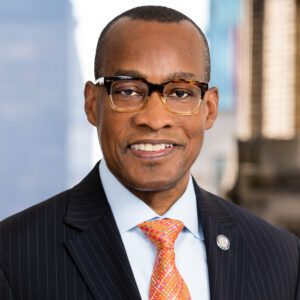Writer: Joshua Andino
 4 min read July 2023 — As cities across the northeast are strategizing over how best to attract businesses and revitalize struggling downtowns, leaders in Philadelphia assess today’s economic climate in their conversations with Invest:.
4 min read July 2023 — As cities across the northeast are strategizing over how best to attract businesses and revitalize struggling downtowns, leaders in Philadelphia assess today’s economic climate in their conversations with Invest:.
According to the Capital Analytics Business Sentiment Survey (CABSS) survey of over 50 business leaders across Invest:’s northern markets showed that while a small majority (55%) of businesses saw the economy as generally following an upward trajectory since the beginning of the year, challenges still remained. Higher interest rates, labor and a general uncertainty were all cited as issues across a number of different markets.
The most visible challenges across northern metros, and in Philadelphia, are visible in downtown. Businesses are reassessing their office footprint in the wake of remote work, with potential long-term impacts on Philadelphia’s – and the country’s, commercial real estate sector. Office-to-residential conversions, while promising, still require capital, and come with unique design and engineering challenges.
Providing an added layer of complexity has been population growth. While not decreasing, Philadelphia’s population has remained relatively flat over the last two years, and while the city has traditionally been considered the more affordable of large, northeastern U.S. metros, its flat growth hints at the wider demographic shifts in the country that has seen the Sunbelt take center stage when it comes to headlines today.
In Philadelphia, the city has seen robust investments into large-scale developments and public-private partnerships such as the Navy Yard, Schuylkill Yards and the Lower Schuylkill Biotech Campus. The region’s life sciences, biotech and healthcare sectors, alongside its higher education ecosystem, provide a number of opportunities for businesses in ancillary industries, researchers and entrepreneurs. Its diverse population, while not expanding, nevertheless provides a dynamic talent pool to recruit from. Its strategic location on the Northeast Corridor provides access to New York, Boston and Washington, D.C., while the Port of Philadelphia anchors the region’s distribution and logistics sector for international trade.
With factors both positive and negative at play, it stands to reason that market uncertainty has emerged as a key theme across projections. Invest: asked a number of leaders across the Philadelphia market to understand what factors they were tracking, which were influencing their decisions, and where they saw continued opportunities or challenges moving forward.
Christopher Kenney, Principal, Strada
 The most significant impacts are time pressures, inflation, and availability of capital. Not exactly an uneventful economic environment! Procurement of construction materials and equipment, particularly for life science projects, is significantly extended. It can take over a year to get generator sets for a laboratory project or even basic electrical equipment. This challenge is a legacy of COVID. It follows that we are asked to do our job of designing much more quickly so that projects can get into procurement queues. What was already an accelerated process based on the digitization of the industry has been even further accelerated by the pressure to procure.
The most significant impacts are time pressures, inflation, and availability of capital. Not exactly an uneventful economic environment! Procurement of construction materials and equipment, particularly for life science projects, is significantly extended. It can take over a year to get generator sets for a laboratory project or even basic electrical equipment. This challenge is a legacy of COVID. It follows that we are asked to do our job of designing much more quickly so that projects can get into procurement queues. What was already an accelerated process based on the digitization of the industry has been even further accelerated by the pressure to procure.
As a result of inflation and demand, it costs us more to do that work faster. Inflation cuts across the entire commercial real estate and construction industry. Acquiring and keeping talent is a huge challenge. The salaries that people demand in an inflationary environment are very large.
Finally, running in tension with procurement pressures and inflation, we are seeing capital being less available to complete projects. It’s harder for developer clients to obtain capital, and entities that bring the capital are becoming more involved at the table during the design and construction processes. We’re seeing a significant slow-up regionally in commercial real estate that supports life science work.
 Michael Young, President and CEO, Temple Health
Michael Young, President and CEO, Temple Health
We are going to be in Struggleville for a while for sure. The current financial health of healthcare providers is a major concern, which is expected to be the norm. For example, one organization lost $976 million in the first three quarters, and they seemed pretty calm. If I lost that kind of money I’d probably be fired. So yeah, the market is tough, with downgrades and bond covenants being violated, and external pressure from other healthcare providers trying to take high-end, profitable patients away. This is particularly true in over-bedded markets such as Philadelphia, located within an hour of New York and Johns Hopkins. This is the toughest market I have seen in my 35-year career, and so I expect there to be potential program closures, hospital closures, and mergers across the country will increase. Thus, it is important for healthcare providers to get their financial health under control to weather this storm.
Jeffrey Lutsky, Co-Chairman and Managing Partner, Stradley Ronon Stevens Young LLP
 The economy has impacted every law firm to some extent, including Stradley Ronon. However, our asset management practice has remained steady and has not been significantly impacted by economic business cycles. There’s a strong demand for services from our large Tier 1 investment management team in both good and challenging economic times. We also are seeing an increase in demand for SEC enforcement and compliance initiatives.
The economy has impacted every law firm to some extent, including Stradley Ronon. However, our asset management practice has remained steady and has not been significantly impacted by economic business cycles. There’s a strong demand for services from our large Tier 1 investment management team in both good and challenging economic times. We also are seeing an increase in demand for SEC enforcement and compliance initiatives.
Where we have seen some slowdown in demand, which I believe all law firms have, is in the M&A field. With interest rates rising rapidly, it has been difficult for businesses to price and value potential transactions. Market uncertainty is not ideal for business transactions, and some clients have put their plans on pause to assess the situation. However, litigation has increased, which is not unusual in a difficult economic climate. We are fortunate to have three large practice areas (asset management, business and litigation), and in almost any business cycle, some are up, and some may be slightly down, but it all seems to work.
Blane Stoddart, President and CEO, BFW Group LLC
 Overall, the real estate markets continue to be robust in the aforementioned sectors because the economy has not gone into full recession. The job market and the worker shortage are major factors fueling our economy. Six million people resigned during COVID. There is a shortage of workers resting in businesses like Target and Walmart paying $15 to $20 per hour with benefits. The worker shortage has kept the economy going and employers are still hiring.
Overall, the real estate markets continue to be robust in the aforementioned sectors because the economy has not gone into full recession. The job market and the worker shortage are major factors fueling our economy. Six million people resigned during COVID. There is a shortage of workers resting in businesses like Target and Walmart paying $15 to $20 per hour with benefits. The worker shortage has kept the economy going and employers are still hiring.
Some sectors like banking and technology have seen major corrections, but the rest of the economy has been strong despite interest rates spikes to tame inflation. The American economy is stronger than we think as long as we have leaders who can perform at a high level.
For cities like Philadelphia, we are in need of leadership from the Mayor, City Council and the Business community to rebuild our economy, our K-12 education system, and to lead out in the areas of public safety. We must create safe spaces for us to enjoy the amenities and benefits of this great City. Staying at home by every objective indicator is not good.
For more information, please visit:

